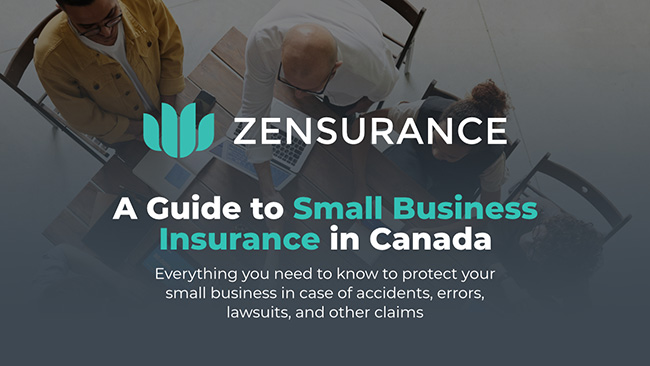Protecting your business from liabilities related to employee occupational injuries is crucial. However, it’s important to understand the distinction between employers’ liability insurance and workers’ compensation insurance in Canada.
Both worker’s compensation (commonly called workers comp) and employers’ liability insurance are designed to cover workplace injuries. They complement one another, but they are distinctly different in purpose, coverage, and legal structure.
This guide will explore the differences between them and highlight how employers’ liability insurance supplements workers’ comp coverage and protects business owners against lawsuits and claims involving work-related injuries and illnesses to employees.

Related Posts
Sign Up for ZenMail
"*" indicates required fields
Categories
What Is Employers’ Liability Insurance?
Employers’ liability insurance is a type of general liability insurance. Its purpose is to protect business owners or companies facing claims or lawsuits made by employees or their families for an employee’s work-related injury, illness, or death.
Although it’s not mandatory coverage for a business to have, it is highly recommended to include it in an overall commercial insurance policy.
It addresses bodily injury claims and lawsuits from employees and their families that are not covered by workers’ comp and employee injuries alleged to have been caused by an employer’s negligence.
What Employers’ Liability Insurance Covers
Employers’ liability insurance is applicable in different situations related to an injured employee’s claim, such as:
- Employees who are not eligible for workers’ comp coverage because they are part-time or contract workers
- Bodily injury claims that are denied by workers’ comp
- Addresses coverage gaps in workers comp if it’s insufficient or not applicable to a particular claim
- Third-party lawsuits from families suing an employer on behalf of an injured or deceased employee
Employers’ liability insurance covers a business’s legal costs and settlements if an employee or their family sues them for compensation and the employee’s medical expenses, lost wages, and future earnings up to the policy’s coverage limit.
Note: Employers’ liability insurance is not designed to cover expenses associated with claims or lawsuits related to discrimination, harassment, or wrongful dismissal. It’s management liability insurance (also called employment practices liability insurance) that covers those legal and financial risks.
What Is Workers’ Compensation Insurance?
Workers’ compensation insurance, or workers’ comp, is mandatory, government-administered insurance provided by the Workplace Safety and Insurance Board (WISB) and regulated in the province or territory where you live or operate.
It is funded by mandatory employer premiums and designed to provide injured workers with wage-loss benefits, coverage for medical expenses and rehabilitation, and resources for employers to help prevent injuries from occurring at their places of business.
Although there are a few exemptions, a business or employer cannot opt out of workers’ comp. There may be subtle differences between provinces, but in general, any small business with employees must register with the Workers’ Compensation Board (WCB) in its jurisdiction.
What Workers’ Compensation Insurance Covers
Workers compensation insurance is no-fault insurance, meaning it covers employee workplace injuries and illnesses regardless of who is responsible for the injury.
Most Canadian employers that have employees are required by law to register with the WCB in their province or territory.
It provides the following benefits to injured employees:
- Compensation for their medical and rehabilitation expenses
- Covers a portion of their lost income while off of work
- Offers compensation to an employee’s family if they die because of a workplace injury or illness
Employees receiving workers comp benefits following a workplace injury or their death are not entitled to sue the employer for compensation.
Workers’ Compensation Boards by Province and Territory
To determine if your business is exempt from registering with the WCB in your jurisdiction or for more information on workers’ comp, visit the applicable Board in your business’s province or territory:
- Alberta: WCB Alberta requires employers to open an account with them within 15 days of hiring their first full- or part-time employee, including temporary, contract, and volunteer employees or family members.
- British Columbia: WorkSafeBC states employers – an individual or organization – are required to carry their coverage when hiring one or more workers on a full- or part-time basis and temporary or contract employees and family members.
- Manitoba: The Workers’ Compensation Board of Manitoba holds that all businesses in mandatory industries, such as construction and manufacturing, must register for coverage.
- New Brunswick: WorkSafeNB says all employers with three or more employees must register for coverage within 15 days of starting the business, be they full-time, part-time, temporary, contract workers, or family members.
- Newfoundland and Labrador: WorkplaceNL requires employers to register for coverage for any employee (full- and part-time, temporary, subcontractors, family members).
- Nova Scotia: The Workers’ Compensation Board of Nova Scotia states registration is mandatory for most employers in the province with three or more employees within 10 days of hiring a third worker.
- Ontario: The Workplace Safety and Insurance Board (WSIB) of Ontario says businesses have 10 days to register with them from the day they hire their first employee.
- Prince Edward Island (PEI): The Workers’ Compensation Board of PEI states employers must register for coverage if they employ one or more workers. Businesses are required to renew their registration annually.
- Quebec: Workers’ Compensation for Quebec (CNESST) requires employers with at least one employee to register within 60 days of hiring their first worker.
- Saskatchewan: The Saskatchewan Workers’ Compensation Board says all employers hiring workers must register and create an account in mandatory industries within 30 days of hiring.
- Northwest Territories and Nunavut: The Workers’ Safety and Compensation Commission requires all businesses to register for coverage.
- Yukon: The Workers’ Safety and Compensation Board requires employers to register within 10 days of starting business operations.
Penalties are imposed on businesses in mandatory industries that fail to register with their provincial or territorial workers’ comp boards.
How to Get Employers Liability Insurance Quickly
Employers’ liability insurance may be included in a general liability insurance policy, or it can be added to one.
Carrying both employers’ liability insurance and signing on to workers’ compensation insurance in your jurisdiction offers business owners added protection and confidence as it helps assure a company is protected whether an employee injury claim is addressed by a WCB or through court.
Zensurance helps protect hundreds of thousands of Canadian small business owners and independent professionals with comprehensive, low-cost commercial insurance policies, including employers’ liability insurance.
Complete our online application for a free quote in under five minutes.
With over 50 insurance providers in our partner network, our friendly broker team can find and customize the policy you need.
– Updated August 27, 2025.
Recent Posts
What Is a Deductible in Small Business Insurance? (Definition, Examples & How It Works)
A deductible is the amount your small business pays out of pocket when you file an insurance claim. Understanding how deductibles work can help you lower premiums, avoid surprises, and choose the right coverage.
Why E-Commerce Insurance Matters for Online Sellers in Canada
If you sell products online in Canada, e-commerce insurance – also known as online business insurance – is essential to protect your finances, inventory, and reputation. Here’s what online sellers, dropshippers, and small e-commerce businesses in Canada need to know.
What Happens If Your Small Business Gets Sued in Canada?
Being sued as a small business owner can be financially and emotionally overwhelming. Legal defence costs can quickly climb into the tens of thousands of dollars. This article explains what happens when your business is sued, how business liability insurance can help cover legal fees, and how to reduce your risk of being sued in the first place.









